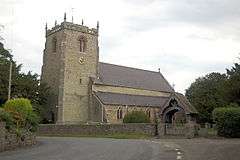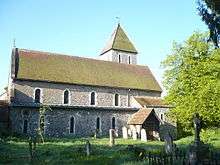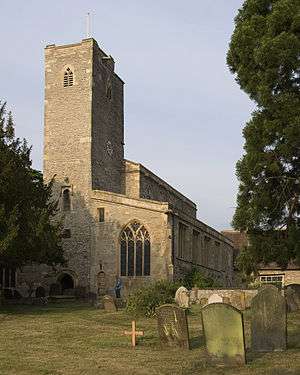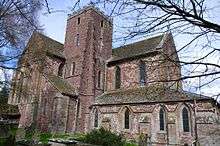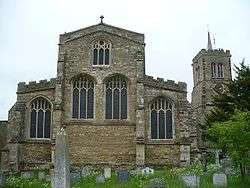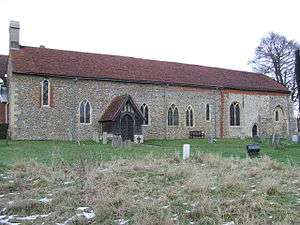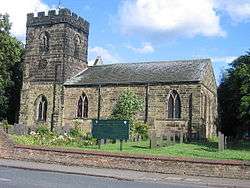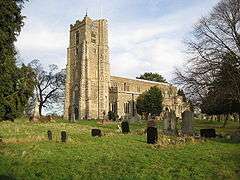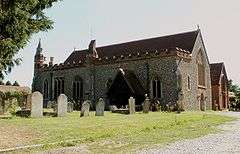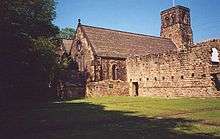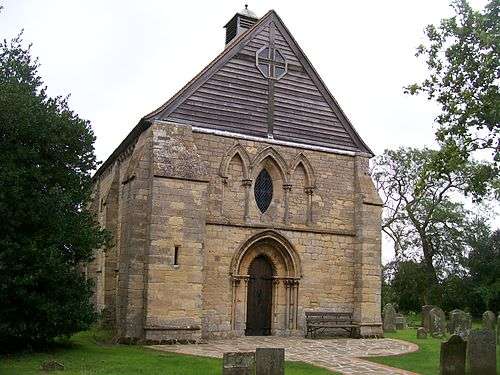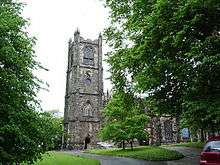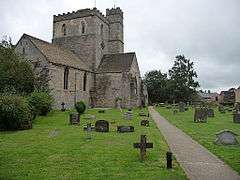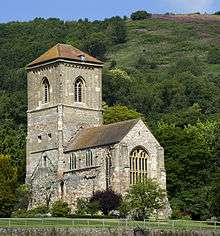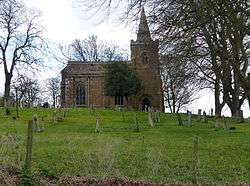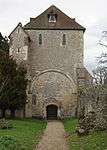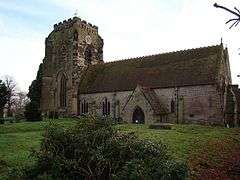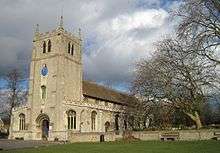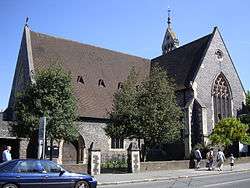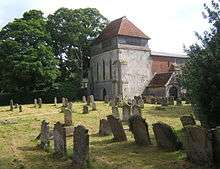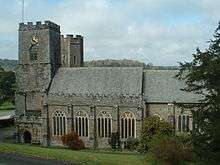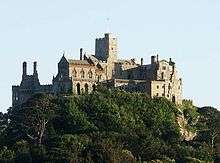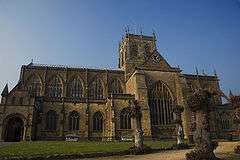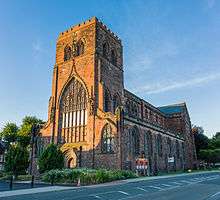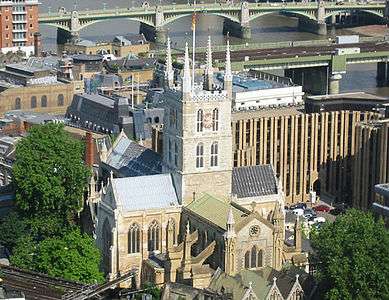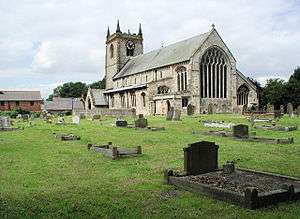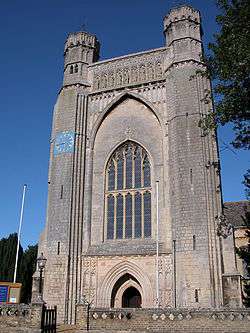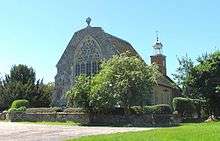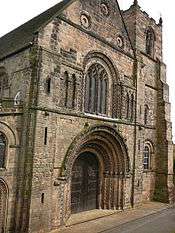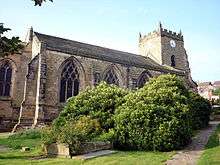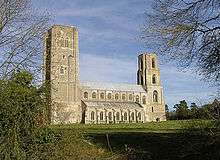List of English abbeys, priories and friaries serving as parish churches
Nearly a thousand religious houses; abbeys, priories and friaries were founded in England and Wales during the medieval period; accommodating monks, friars or nuns who had taken vows of obedience, poverty and chastity; each house being led by an abbot or abbess, or by a prior or prioress. By their foundation monasteries and nunneries (although not friaries) had acquired endowments of land, property and parochial tithes, and many had become further enriched through subsequent bequests and pilgrim donations.[1] The majority of these houses had come into existence between the 11th and 13th centuries, but by the 14th century decline had set in, hastened by the Black Death in the middle of the century.[2] Later medieval benefactors increasingly regarded educational establishments, parish and collegiate churches as more appropriate recipients of bequests and donations; and by the early 16th century some religious communities had become very small, and few were more than half full. In those year a number were amalgamated or dissolved through the initiatives of reforming bishops, the wealth released being used to endow grammar schools and colleges at Oxford and Cambridge Universities.[3]
The process that has come to be known as the Dissolution of the Monasteries began formally in 1536 following the Act for Suppression of the Lesser Monasteries. This transferred the lands and the property of religious houses with an income of less than £200 (equivalent to £110,000 in 2015)[4] a year to the crown.[5] The motives behind this are complex, and include Henry VIII's conflict with the popes over his desire for a divorce, which led to the foundation of the Church of England; and also Henry's ambition to increase the income of the crown. Under this first Act, about one-third of the religious houses were closed. This resulted in the rebellion known as the Pilgrimage of Grace. The rebellion failed, and the process of dissolution was extended; abbots, abbesses and priors were placed under increasing pressure and threats in order to persuade them to surrender their monasteries to the crown; four who refused being accused of treason and executed. The last religious house to close was Waltham Abbey in March 1540.[6]
The wealth and properties of the monasteries came into the ownership of the crown, although much was soon sold off; but what happened to the buildings of the abbeys, priories and friaries themselves varied. Most of them were immediately stripped of their valuable lead roofs, and fell into decay. Parts of some were converted into mansions by new owners. But, in around ten percent of cases, former monastic churches or other buildings have continued in religious use for parochial worship. This was necessarily the case for that small number of religious houses where part already functioned as a full parish church, as at Wymondham Abbey. Secondly, there were a number of instances where wealthy parishes or their benefactors, purchased a former monastic church as a replacement parish church building, as at Selby Abbey. Thirdly were those cases where part of a monastic church building was already in parochial use as a chapel of ease served by a stipendiary priest, in which case the dissolution commissioners would seek, if possible, for these clergy to continue as perpetual curates on fixed annual stipends charged against the former monastic endowments; with an appropriate portion of the monastic church retained for them to use. Priories of the Augustinian order, in particular, had been required by their rule to maintain a chapel of ease within their church for parochial worship, with the consequence that partial survival is more common for former Augustinian priory churches. Churches of dissolved friaries on the other hand, even though they had commonly served worshipping urban congregations, were rarely able to continue in parochial use as friaries lacked the foundation endowments from which a perpetual curacy might be established. Fourthly, former monastic structures that had fallen into ruin at the dissolution, or continued in secular use, were not infrequently brought back into use for parochial worship in later years out of subsequent private benefactions.
Ten medieval English cathedrals had been 'monastic', in that they had been simultaneously abbeys, and eight of these (Bath and Coventry being the exceptions) were refounded as secular cathedrals by Henry VIII. A further six former abbeys were raised to be cathedrals of newly created dioceses. Other former abbeys and priories became parish churches; of which two, Saint Albans and Southwark have become cathedrals since, while both also continuing to serve their respective parishes.[7] In some cases, the whole of a former monastic church now serves as the parish church; but more commonly only of part of the original church has survived, incorporated into the fabric of a continuing church or chapel; as for example the north aisle of the nave of Wroxall Priory. At Beaulieu Abbey, it is the refectory that has been so converted. In a few cases, such as Tilty Abbey, the gatehouse chapel, the capella ante portas, now forms the parish church. Where former monastic churches were maintained after the dissolution as chapels of ease with their clergy as perpetual curates, in almost all instances these chapels will have been raised to full parish church status in the course of the 19th century.
113 former monastic buildings in England that have continued to function as parish churches or chapels of ease since the dissolution of the monasteries are included in this list, including some whose monastic functions had ceased much earlier; and also some whose conversion to parochial use happened in recent centuries. Churches are only listed where they maintain at least some substantial elements of their former monastic fabric, the extent of which is noted. Excluded are those former monastic churches that have never functioned for parochial worship, including some, such as the chapel of Jesus College, Cambridge, that have remained otherwise in continuous religious use; and also those churches converted into cathedrals by Henry VIII. All these surviving monastic churches have been listed by English Heritage, most at Grade I, the others at Grade II* or II.
Key
| Grade | Criteria[8] | ||||||||||||
|---|---|---|---|---|---|---|---|---|---|---|---|---|---|
| Grade I | Buildings of exceptional interest, sometimes considered to be internationally important. | ||||||||||||
| Grade II* | Particularly important buildings of more than special interest. | ||||||||||||
| Grade II | Buildings of national importance and special interest. | ||||||||||||
| "—" denotes a work that is not graded. | |||||||||||||
Works
References
- ↑ Woodward & McIlwain 1993, pp. 2–3
- ↑ Woodward & McIlwain 1993, p. 8
- ↑ Woodward & McIlwain 1993, p. 10
- ↑ UK CPI inflation numbers based on data available from Gregory Clark (2016), "The Annual RPI and Average Earnings for Britain, 1209 to Present (New Series)" MeasuringWorth.
- ↑ Woodward & McIlwain 1993, pp. 10–12
- ↑ Woodward & McIlwain 1993, pp. 14–17
- ↑ Woodward & McIlwain 1993, pp. 18–19
- ↑ Listed Buildings, Historic England, retrieved 27 March 2015
- 1 2 3 4 5 6 7 8 9 10 11 12 13 14 15 16 17 18 19 20 Clifton-Taylor 1974, p. 235
- ↑ Historic England, "Church of St Mary and St Melor, Amesbury (1182066)", National Heritage List for England, retrieved 22 March 2012
- ↑ Historic England, "Church of St Mary, Atherstone (1365164)", National Heritage List for England, retrieved 22 March 2012
- 1 2 3 4 5 6 7 8 9 10 11 12 13 14 15 16 17 18 Clifton-Taylor 1974, p. 234
- ↑ Historic England, "Abbey Church of St Peter and St Paul, Bath (1394015)", National Heritage List for England, retrieved 22 March 2012
- ↑ Thorold 1986, p. 73
- 1 2 3 4 5 6 7 8 9 10 11 12 13 14 15 16 17 18 19 20 Clifton-Taylor 1974, p. 232
- ↑ Historic England, "Church of the Blessed Virgin and Child, Beaulieu (1156943)", National Heritage List for England, retrieved 13 March 2012
- 1 2 3 4 5 6 7 8 9 10 11 12 13 14 15 16 17 18 19 Clifton-Taylor 1974, p. 233
- ↑ Historic England, "Church of St Mary, Binham (1170780)", National Heritage List for England, retrieved 15 March 2012
- 1 2 Thorold 1986, p. 59
- ↑ Historic England, "Church of St Helen, London (1286458)", National Heritage List for England, retrieved 15 March 2012
- ↑ Historic England, "Church of St Laurence, Blackmore (1197161)", National Heritage List for England, retrieved 12 March 2012
- ↑ Historic England, "Church of St Mary, Blanchland (1304226)", National Heritage List for England, retrieved 15 March 2012
- ↑ Historic England, "Blyth Priory Church of St Mary and St Martin, Blyth (1239182)", National Heritage List for England, retrieved 16 March 2012
- ↑ Historic England, "Church of St Mary, Bolton Abbey (1166745)", National Heritage List for England, retrieved 22 March 2012
- ↑ Historic England, "Parish Church of St Peter and St Paul, Bourne (1260249)", National Heritage List for England, retrieved 14 March 2012
- ↑ Historic England, "The Priory Church of St Mary and St Blaize, Boxgrove (1230005)", National Heritage List for England, retrieved 22 March 2012
- ↑ Historic England, "Church of St Mary and St Hardulph, Breedon on the Hill (1361364)", National Heritage List for England, retrieved 14 March 2012
- ↑ Historic England, "Parish Church of St Mary, Bridlington (1346530)", National Heritage List for England, retrieved 22 March 2012
- ↑ Historic England, "The Priory Church (1303969)", National Heritage List for England, retrieved 15 March 2012
- ↑ Historic England, "Church of St James, Bristol (1282067)", National Heritage List for England, retrieved 13 March 2012
- ↑ Newman & Pevsner 2006, pp. 171–173
- ↑ Historic England, "Church of St Mary the Virgin, Bromfield (1291888)", National Heritage List for England, retrieved 16 March 2012
- ↑ Historic England, "Church of St Mary, Bungay (1216850)", National Heritage List for England, retrieved 22 March 2012
- ↑ Historic England, "Church of St Mary, Canons Ashby (1187152)", National Heritage List for England, retrieved 15 March 2012
- ↑ Hyde & Pevsner 2010, pp. 267–272
- ↑ Historic England, "Priory Church of St Mary, Lower Allithwaite (1335798)", National Heritage List for England, retrieved 14 March 2012
- 1 2 3 4 5 6 7 8 9 Clifton-Taylor 1974, p. 231
- ↑ Historic England, "Church of St Mary and St Nicholas, Chetwode (1211496)", National Heritage List for England, retrieved 11 March 2012
- ↑ Newman & Pevsner 2006, pp. 199–200
- ↑ Historic England, "Church of St Michael, Chirbury with Brompton (1055048)", National Heritage List for England, retrieved 21 March 2012
- ↑ Historic England, "Christchurch Priory and Parish Church (1110141)", National Heritage List for England, retrieved 13 March 2012
- ↑ Thorold 1986, p. 156
- ↑ Historic England, "Church of St Nicholas, Coggeshall Abbey (1337925)", National Heritage List for England, retrieved 12 March 2012
- ↑ Historic England, "Church of St Mary and St Bartholomew, Cranborne (1120181)", National Heritage List for England, retrieved 12 March 2012
- ↑ Historic England, "Crowland Abbey (1064550)", National Heritage List for England, retrieved 14 March 2012
- ↑ Thorold 1986, p. 74
- ↑ Historic England, "Davington Priory (1069404)", National Heritage List for England, retrieved 14 March 2012
- ↑ Historic England, "Church of St James, Deeping St. James (1062680)", National Heritage List for England, retrieved 14 March 2012
- ↑ Historic England, "The Church of St Mary, Deerhurst (1151998)", National Heritage List for England, retrieved 13 March 2012
- ↑ Historic England, "Abbey Church of St Peter and St Paul, Dorchester (1193595)", National Heritage List for England, retrieved 16 March 2012
- ↑ Historic England, "Church of St Mary, Abbey Dore (1099794)", National Heritage List for England, retrieved 14 March 2012
- ↑ Historic England, "Church of St Peter, Dunstable (1114581)", National Heritage List for England, retrieved 11 March 2012
- ↑ Historic England, "Priory Church of St George, Dunster (1057646)", National Heritage List for England, retrieved 22 March 2012
- ↑ Historic England, "Church of St Mary, St Katherine and All Saints, Edington (1364257)", National Heritage List for England, retrieved 22 March 2012
- ↑ Historic England, "Parish Church of St Mary and St Helena, Elstow (1114168)", National Heritage List for England, retrieved 11 March 2012
- ↑ Pevsner 1974, p. 131
- ↑ Historic England, "Church of St Bartholomew, Farewell and Chorley (1374273)", National Heritage List for England, retrieved 22 March 2012
- ↑ Historic England, "Church of St James, Freiston (1308415)", National Heritage List for England, retrieved 15 March 2012
- ↑ Historic England, "Church of St Mary and St Laurence, Great Bricett (1352160)", National Heritage List for England, retrieved 22 March 2012
- ↑ Historic England, "Priory Church of St Mary and St Michael, Malvern (1082794)", National Heritage List for England, retrieved 22 March 2012
- ↑ Historic England, "Parish Church of Saint Mary and Saint George, Church Gresley (1204963)", National Heritage List for England, retrieved 21 April 2013
- ↑ Historic England, "Church of St Mary the Virgin, Hatfield Broad Oak (1186272)", National Heritage List for England, retrieved 12 March 2012
- ↑ Historic England, "Parish Church of St Andrew, Hatfield Peverel (1308736)", National Heritage List for England, retrieved 12 March 2012
- ↑ Historic England, "The Priory Church of St Andrews', Hexham (1042576)", National Heritage List for England, retrieved 15 March 2012
- ↑ Historic England, "Church of St Mary, Knaith (1064050)", National Heritage List for England, retrieved 15 March 2012
- ↑ Hyde & Pevsner 2010, pp. 87–89
- ↑ Historic England, "Church of St Mary, Holme Abbey (1144608)", National Heritage List for England, retrieved 11 March 2012
- ↑ Historic England, "Church of St Mary, Hurley (1117524)", National Heritage List for England, retrieved 11 March 2012
- 1 2 3 4 Thorold 1986, p. 177
- ↑ Historic England, "Monastery of St Paul: Ruins of Jarrow Monastery (1025198)", National Heritage List for England, retrieved 12 March 2012
- ↑ Historic England, "Church of St Leonard, Woodhall Spa (1288191)", National Heritage List for England, retrieved 15 March 2012
- ↑ Historic England, "Church of St Mary and All Saints, South Kyme (1061749)", National Heritage List for England, retrieved 15 March 2012
- ↑ Thorold 1986, p. 19
- ↑ Hyde & Pevsner 2010, pp. 479–485
- ↑ Historic England, "Church of St Mary, Burtholme (1335636)", National Heritage List for England, retrieved 11 March 2012
- ↑ Pevsner 1974, p. 167
- ↑ Historic England, "Church of All Saints, Lapley (1374057)", National Heritage List for England, retrieved 22 March 2012
- ↑ Thorold 1986, p. 245
- ↑ Historic England, "The Priory Church of St Peter and St Paul, Leominster (1077617)", National Heritage List for England, retrieved 14 March 2012
- ↑ Historic England, "Church of St Swithin, Leonard Stanley (1171487)", National Heritage List for England, retrieved 13 March 2012
- ↑ Historic England, "Church of St Mary, Letheringham (1283700)", National Heritage List for England, retrieved 22 March 2012
- ↑ Thorold 1986, p. 50
- ↑ Historic England, "Church of St Giles, Little Malvern (1349255)", National Heritage List for England, retrieved 22 March 2012
- ↑ Historic England, "Abbey Church of St Mary and St Aldhelm, Malmesbury (1269316)", National Heritage List for England, retrieved 22 March 2012
- ↑ The last of the Gilbertine Priories - St Mary's, Old Malton, This is Ryedale, retrieved 25 March 2012
- ↑ Historic England, "Priory Church of St Mary, Malton (1201925)", National Heritage List for England, retrieved 25 March 2012
- ↑ Thorold 1986, p. 201
- ↑ Historic England, "Church of Our Lady, Merevale (1365174)", National Heritage List for England, retrieved 22 March 2012
- 1 2 Thorold 1986, p. 69
- ↑ Historic England, "The Abbey Church of St Mary and St Sexburga, Minster-on-Sea (1273489)", National Heritage List for England, retrieved 14 March 2012
- ↑ Thorold 1986, p. 81
- ↑ Thorold 1986, p. 70
- ↑ Historic England, "Church of St Mary, Nun Monkton (1190942)", National Heritage List for England, retrieved 25 March 2012
- ↑ Historic England, "Church of St Andrew, Owston and Newbold (1074871)", National Heritage List for England, retrieved 14 March 2012
- ↑ Historic England, "Pamber Priory: Priory Church of the Holy Trinity, Our Lady, and St John the Baptist, Monk Sherborne (1092954)", National Heritage List for England, retrieved 13 March 2012
- ↑ Historic England, "Abbey Church of Holy Cross with St Edburgha, Pershore (1387027)", National Heritage List for England, retrieved 22 March 2012
- ↑ Historic England, "Parish Church of St Mary the Virgin, Barnstaple (1385316)", National Heritage List for England, retrieved 12 March 2012
- ↑ Historic England, "Church of St Editha, Polesworth (1252564)", National Heritage List for England, retrieved 22 March 2012
- ↑ Thorold 1986, p. 197
- ↑ Thorold 1986, p. 88
- ↑ Historic England, "Greyfriars Church, Reading (1321952)", National Heritage List for England, retrieved 11 March 2012
- 1 2 3 Thorold 1986, p. 219
- ↑ Historic England, "Abbey Church of St Mary, Romsey (1092649)", National Heritage List for England, retrieved 13 March 2012
- ↑ Thorold 1986, p. 213
- ↑ Thorold 1986, p. 209
- ↑ One Thousand Years of St Bees. St Bees PCC 2013
- ↑ Hyde & Pevsner 2010, pp. 596–599
- ↑ Historic England, "Church of St Mary and St Bega, St. Bees (1336027)", National Heritage List for England, retrieved 11 March 2012
- ↑ Historic England, "Church of St Germanus, St. Germans (1140544)", National Heritage List for England, retrieved 11 March 2012
- ↑ Historic England, "Church of St Mary and St Germain, Selby (1132591)", National Heritage List for England, retrieved 25 March 2012
- ↑ Historic England, "Church of St Andrew, Pointon and Sempringham (1241280)", National Heritage List for England, retrieved 15 March 2012
- ↑ Historic England, "Abbey Church of St Mary, Sherborne (1110824)", National Heritage List for England, retrieved 12 March 2012
- ↑ Newman & Pevsner 2006, pp. 517–521
- ↑ Historic England, "Abbey Church of the Holy Cross, Shrewsbury (1246392)", National Heritage List for England, retrieved 21 March 2012
- ↑ Historic England, "Church of St Bartholomew the Great, London (1180873)", National Heritage List for England, retrieved 15 March 2012
- ↑ Thorold 1986, p. 237
- ↑ Historic England, "Church of St Andrew, Stogursey (1057404)", National Heritage List for England, retrieved 22 March 2012
- ↑ Historic England, "Church of St Mary, Swine (1083427)", National Heritage List for England, retrieved 25 March 2012
- ↑ Historic England, "Abbey Church of St Mary, Tewkesbury (1201159)", National Heritage List for England, retrieved 13 March 2012
- ↑ Historic England, "Thorney Abbey and Abbey House (1127481)", National Heritage List for England, retrieved 14 March 2012
- ↑ Historic England, "Church of St Peter, Thurgarton (1045527)", National Heritage List for England, retrieved 16 March 2012
- ↑ Historic England, "Abbey Church of St Mary the Virgin, Tilty (1169090)", National Heritage List for England, retrieved 12 March 2012
- ↑ Pevsner 1974, pp. 288–289
- ↑ Historic England, "Church of St Mary, Tutbury (1038524)", National Heritage List for England, retrieved 22 March 2012
- ↑ Pollard & Pevsner 2006, pp. 597–598
- ↑ Historic England, "Church of St Thomas the Martyr, Upholland (1201666)", National Heritage List for England, retrieved 14 March 2012
- ↑ Historic England, "Church of the Holy Cross and St Lawrence: Ruins to east of church, Waltham Abbey (1124155)", National Heritage List for England, retrieved 12 March 2012
- ↑ Thorold 1986, p. 11
- ↑ Historic England, "Church of St Cuthbert and St Mary, Worksop Abbey, and remains of cloister wall (1156758)", National Heritage List for England, retrieved 16 March 2012
- ↑ Historic England, "Church of St Leonard, Beausale, Haseley, Honiley and Wroxall (1035066)", National Heritage List for England, retrieved 22 March 2012
- ↑ Historic England, "Abbey Church of St Mary and St Thomas of Canterbury, Wymondham (1297494)", National Heritage List for England, retrieved 15 March 2012
- ↑ Historic England, "Church of Holy Trinity and wall attached to southeast, York (1257274)", National Heritage List for England, retrieved 25 March 2012
- Bibliography
- Clifton-Taylor, Alec (1974), English Parish Churches as Works of Art, London: Batsford, ISBN 0-7134-2776-0
- Hyde, Matthew; Pevsner, Nikolaus (2010) [1967], Cumbria, The Buildings of England, New Haven and London: Yale University Press, ISBN 978-0-300-12663-1
- Newman, John; Pevsner, Nikolaus (2006), Shropshire, The Buildings of England, New Haven and London: Yale University Press, ISBN 0-300-12083-4
- Pevsner, Nikolaus (1974), Staffordshire, The Buildings of England, Harmondsworth: Penguin Books, ISBN 0-14-071046-9
- Pollard, Richard; Pevsner, Nikolaus (2006), Lancashire: Liverpool and the South-West, The Buildings of England, New Haven and London: Yale University Press, ISBN 0-300-10910-5
- Thorold, Henry (1986), Cathedrals Abbeys and Priories of England and Wales, Collins, ISBN 0-00-217241-0
- Woodward, G. W. O.; McIlwain, John (1993), Dissolution of the Monasteries, Norwich: Jarrold, ISBN 0-85372-617-5


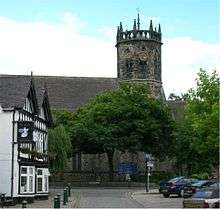
Sep2004.jpg)

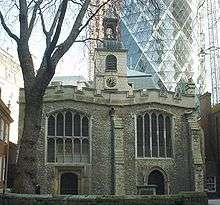


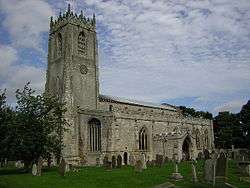
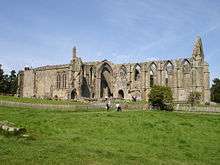
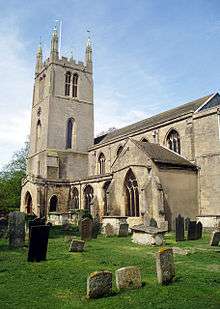
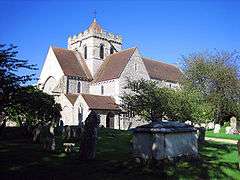
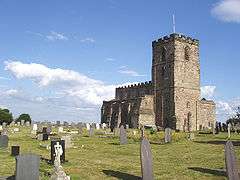
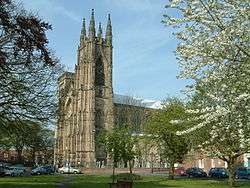


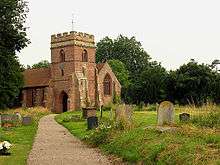
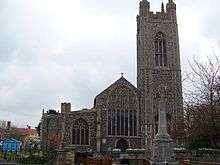
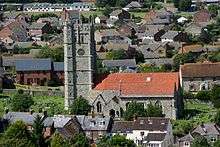
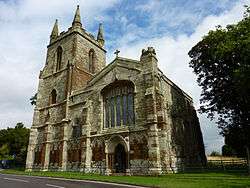

Mar2006.jpg)
